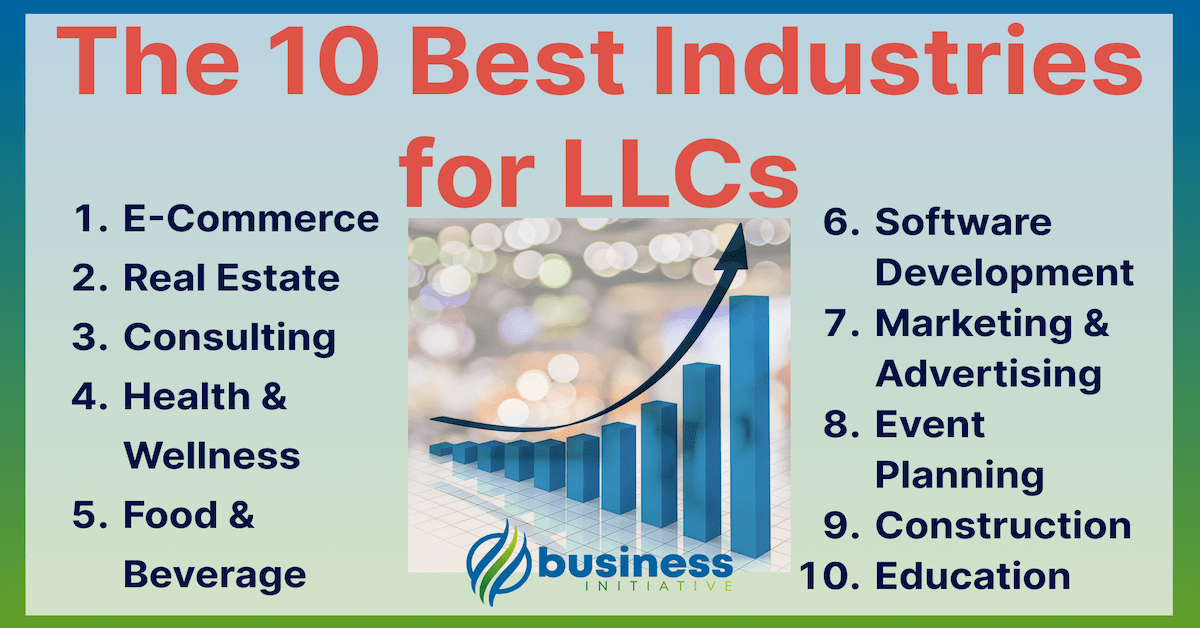Limited Liability Companies (LLCs) have become an increasingly popular business structure due to their flexibility, simplicity, and the protection they offer to business owners.
An LLC is a hybrid entity that combines elements of partnerships and corporations, providing limited liability protection for its members while allowing for pass-through taxation.
 Key Takeaways
Key Takeaways
- Understanding the most popular industries for LLC formation can help identify potential opportunities and competition in your desired market.
- The top industries for LLCs often have lower barriers to entry, making it easier for entrepreneurs to start a business.
- Some of the leading sectors include e-commerce, construction, consulting, food services, and healthcare; staying aware of these trends is crucial.
- Adapting your business plan to cater to the needs of these successful industries may increase your chances of success.
- Analyzing industry trends will allow you to better navigate challenges and capitalize on growth opportunities within your market.
Advantages of Forming an LLC
-
Limited Liability Protection: Members are not personally liable for the company’s debts or liabilities. This shields personal assets like homes and cars from being seized to cover business obligations.
-
Pass-through Taxation: Profits and losses flow directly through to the owners’ personal tax returns, avoiding double taxation experienced by corporations.
-
Flexibility in Management Structure: Unlike corporations, there are no strict requirements on management roles or board structures in an LLC.
Understanding industry trends for LLC formation is crucial for aspiring entrepreneurs as it helps identify potential opportunities, gauge competition, and align with market demands.
 Table of Contents
Table of Contents
By analyzing the most popular industries for LLC formation, entrepreneurs can make informed decisions about which sectors to enter or avoid and decide on the best course of action for their entrepreneurial journey…
Let’s dive in, shall we?
Top 10 Most Popular Industries for LLC Formation Today
As the business landscape continues to evolve, it’s essential to understand which trades are seeing the most significant growth in LLC formation.
Below, we highlight the current top 10 markets, along with their key characteristics and factors contributing to their massive popularity.
Percentage of Non-Corporate Business Applications by Industry
| Rank | Industry | Percentage of Applications |
|---|---|---|
| 1 | Retail Trade | 18.98% |
| 2 | Professional Services | 12.77% |
| 3 | Construction | 9.72% |
| 4 | Other Services | 8.87% |
| 5 | Administrative and Support | 7.75% |
| 6 | Transportation and Warehousing | 6.48% |
| 7 | Health Care and Social Assistance | 6.04% |
| 8 | Accommodation and Food Services | 5.55% |
| 9 | Real Estate | 4.98% |
| 10 | Finance and Insurance | 3.99% |
1. Retail Trade (18.98%)

The Retail Trade sector consists of businesses primarily involved in selling merchandise in small quantities to the general public.
This sector encompasses a wide range of retail formats including physical stores, online shops, and direct sales methods like catalogs and infomercials.
Retailers are designed to attract a high volume of customers through extensive product displays and mass-media advertising.
They sell a variety of goods, from everyday items to specialized products, and often provide after-sales services such as repairs and installations.
2. Professional Services (12.77%)

The Professional, Scientific, and Technical Services sector comprises establishments that specialize in performing professional, scientific, and technical activities for others.
Starting a business in this industry requires a high degree of expertise and training.
Businesses in this sector provide a wide range of services including legal advice, accounting, architectural and engineering design, computer services, consulting, research, advertising, photography, translation, and veterinary services.
These establishments cater to clients across various industries and sometimes households, offering specialized services based on their expertise.
This sector does not include businesses primarily involved in day-to-day office administrative services, such as financial planning, billing, recordkeeping, personnel supply, and logistics, which are classified under Administrative and Support and Waste Management and Remediation Services.
3. Construction (9.72%)

The Construction sector comprises establishments primarily engaged in building construction or engineering projects, such as highways and utility systems.
This sector includes businesses involved in site preparation and land subdivision for new construction.
Construction activities encompass new projects, additions, alterations, maintenance, and repairs, managed from a fixed business location but typically executed at multiple project sites.
These activities are usually specified in prime contracts with project owners or subcontracts with other construction businesses.
General contractors, also known as design-builders, construction managers, turnkey contractors, or joint-venture contractors, oversee entire construction projects.
They often subcontract specific parts of their projects to specialty trade contractors, who focus on particular components like masonry, painting, and electrical work.
For-sale builders, or speculative builders, construct buildings for sale on sites they own, involving site acquisition and securing financial backing.
This sector is divided into three subsectors:
-
Construction of Buildings,
-
Heavy and Civil Engineering Construction,
-
and Specialty Trade Contractors.
These distinctions highlight the variations in equipment, workforce skills, and production processes required for different types of construction projects.
4. Other Services (8.87%)

The Other Services (except Public Administration) sector includes a diverse range of establishments providing services not classified elsewhere.
This sector encompasses activities such as equipment and machinery repair, religious activities, grantmaking, advocacy, dry cleaning, laundry services, personal care, death care, pet care (excluding veterinary services), photofinishing, temporary parking, and dating services.
Additionally, private households employing workers for household operations are included in this sector.
Establishments primarily engaged in retailing new equipment while also performing repairs and general maintenance are classified under the Retail Trade sector, not here.
5. Administrative and Support (7.75%)

The Administrative and Support and Waste Management and Remediation Services sector comprises establishments that perform routine support activities for the day-to-day operations of other organizations.
These essential services, often conducted in-house by various sectors, include office administration, hiring and placing personnel, document preparation, solicitation, collection, security and surveillance, cleaning, and waste disposal.
Businesses in this sector typically operate on a contract or fee basis, specializing in one or more support activities.
While these services are crucial for many industries and sometimes households, establishments focused on strategic and organizational planning for their company are classified under Management of Companies and Enterprises.
Government entities managing programs are classified under Public Administration.
6. Transportation and Warehousing (6.48%)

The Transportation and Warehousing sector encompasses industries involved in the transportation of passengers and cargo, warehousing and storage for goods, scenic and sightseeing transportation, and support activities related to various modes of transportation.
These establishments utilize transportation equipment or facilities, with the type of equipment varying by mode, including air, rail, water, road, and pipeline.
This sector is categorized into subsectors for each mode of transportation, warehousing and storage, and support activities.
It also includes subsectors for scenic and sightseeing transportation, postal services, and courier services.
Support activities, such as freight transportation arrangement and routine maintenance of transportation equipment, are inherently multimodal and share production process similarities.
Warehousing establishments in this sector are distinct from merchant wholesalers as they do not sell goods.
Excluded from this sector are establishments primarily providing travel arrangements, rental and leasing of transportation equipment without operators, and medical care transportation services, which are classified under different sectors.
7. Health Care and Social Assistance (6.04%)

The Health Care and Social Assistance sector comprises establishments dedicated to providing health care and social assistance services to individuals.
This profession includes a range of services from medical care to social assistance, often blurring the lines between these activities.
Services are delivered by trained professionals such as health practitioners and social workers, with many industries defined by the educational degrees held by these practitioners.
Excluded from this sector are yoga and aerobics instruction, physical fitness facilities, personal fitness training services, and non-medical diet and weight reduction centers, which are classified under other sectors.
These services, while health-related, are not typically delivered by health practitioners.
8. Accommodation and Food Services (5.55%)

The Accommodation and Food Services sector includes establishments that provide lodging and/or prepare meals, snacks, and beverages for immediate consumption.
This sector combines accommodation and food services establishments because these activities are often offered together at the same location.
Some establishments that provide food and beverage services are classified in other sectors.
For instance, civic and social organizations fall under Other Services (except Public Administration), amusement and recreation parks, dinner theaters, and other entertainment facilities are part of Arts, Entertainment, and Recreation, and motion picture theaters are classified under Information.
9. Real Estate (4.98%)

The Real Estate and Rental and Leasing sector consists of establishments primarily engaged in renting, leasing, or allowing the use of tangible or intangible assets, and those providing related services.
This includes businesses that rent out their own properties, whether tangible (like real estate and equipment) or intangible (like patents and trademarks).
This sector also encompasses establishments involved in managing real estate for others, selling, renting, and buying real estate on behalf of clients, and appraising real estate.
These activities are closely tied to the sector’s core functions.
Key components include real estate lessors, equipment lessors (covering items like motor vehicles, computers, and consumer goods), and lessors of nonfinancial intangible assets.
Excluded from this sector are businesses primarily engaged in renting or leasing equipment with operators, as these are classified based on the nature of the services provided (such as transportation or construction).
Additionally, mortgage Real Estate Investment Trusts (REITs) and establishments managing the financial portfolios of REITs on a fee or commission basis fall under the Finance and Insurance sector.
10. Finance and Insurance (3.99%)

The Finance and Insurance trade encompasses establishments primarily engaged in financial transactions and in facilitating such transactions.
This includes three main types of activities:
1. Financial Intermediation:
Raising funds by taking deposits or issuing securities, and using those funds to make loans or purchase securities.
This involves channeling funds from lenders to borrowers, transforming or repackaging the funds in terms of maturity, scale, and risk.
2. Insurance and Annuities:
Pooling risk by underwriting insurance and annuities, collecting premiums or fees, building reserves, investing those reserves, and making contractual payments.
3. Specialized Support Services:
Providing services that facilitate or support financial intermediation, insurance, and employee benefit programs.
Monetary authorities responsible for monetary control are also included in this sector.
The subsectors, industry groups, and industries are defined based on unique production processes, utilizing specialized human resources and physical capital.
The way establishments acquire and allocate financial capital, and their sources and uses of funds, further distinguish their production processes.
Most subsectors contain intermediaries with similar patterns of raising and using funds, and establishments engaged in activities facilitating financial or insurance intermediation.
Financial services often require higher-level organizational structures for defining production processes, and activities at single locations may represent separate production processes.
Establishments providing financial transaction processing services are included in this sector due to the integral nature of these activities to the production of finance and insurance services.
Legal entities holding portfolios of assets on behalf of others, such as funds and trusts, are also part of this sector, while separate establishments managing these funds are classified under Other Financial Investment Activities.
Notable Trends and Patterns
Let’s look at a few of the significant trends we’ve noticed in the data and shed some light on the driving forces behind why so many entreprenurs prefer these trades when starting their very own LLCs.
Evolving Retail Landscape
The Retail Trade sector has experienced significant growth due to several notable trends.
The rise of e-commerce has transformed the retail landscape, allowing businesses to reach a global audience and operate beyond the constraints of physical locations.
Additionally, the integration of technology, such as mobile shopping apps and personalized online experiences, has enhanced customer engagement and convenience.
The shift towards omnichannel retailing, where businesses combine online and offline channels, has also contributed to the sector’s growth.
Furthermore, changing consumer preferences, such as the demand for fast delivery and seamless shopping experiences, have driven retailers to innovate and expand their services.
Growing Demand for Expertise
The Professional Services sector has seen substantial growth driven by the increasing complexity of business operations and the demand for specialized expertises.
As businesses navigate regulatory changes, technological advancements, and global competition, they rely on professional services for legal advice, accounting, consulting, and more.
The rise of digital transformation and the need for cybersecurity and IT services have also fueled the sector’s expansion.
Moreover, the trend towards outsourcing non-core functions allows companies to focus on their primary activities while leveraging the expertise of professional service providers.
Infrastructure and Urban Development
The Construction sector’s growth is influenced by several key trends.
Urbanization and population growth have led to increased demand for residential and commercial buildings.
Infrastructure development projects, such as highways and utility systems, are also on the rise as governments invest in improving public services.
Technological advancements, including the use of Building Information Modeling (BIM) and sustainable construction practices, have enhanced efficiency and reduced costs.
Additionally, the push for renewable energy projects and green buildings reflects the sector’s adaptation to environmental concerns and regulations.
Diverse Service Offerings
The Other Services sector encompasses a diverse range of activities, and its growth is driven by several factors.
The increasing focus on convenience and personal services, such as dry cleaning, laundry, and personal care, caters to busy lifestyles.
The rise of the gig economy and freelance work has boosted demand for specialized services like pet care, temporary parking, and dating services.
Additionally, the aging population has led to growth in death care services market.
The sector’s ability to adapt to changing consumer needs and preferences contributes to its continued expansion.
Operational Efficiency and Outsourcing
Administrative and Support services have grown due to the need for businesses to streamline operations and focus on core activities.
Outsourcing routine tasks such as office administration, payroll, and cleaning services allows companies to improve efficiency and reduce costs.
The rise of remote work and the gig economy has increased demand for flexible staffing solutions and personnel placement services.
Additionally, the emphasis on security and data protection has driven growth in security and surveillance services.
Environmental concerns have also spurred the demand for waste management and remediation services.
Logistics and Global Trade
The Transportation and Warehousing sector’s growth is propelled by the increasing globalization of trade and the rise of e-commerce.
The need for efficient logistics and supply chain management has led to greater demand for transportation services, including air, rail, road, and sea freight.
The expansion of warehousing facilities to accommodate growing inventory requirements is another key trend.
Technological advancements, such as automation and real-time tracking, have improved operational efficiency.
Additionally, the rise of same-day and next-day delivery expectations has intensified the need for robust transportation and warehousing solutions.
Aging Population and Medical Advances
The Health Care and Social Assistance sector continues to grow due to several significant trends.
The aging population has increased the demand for health care services, including medical care, nursing, and social support.
Advances in medical technology and treatments have expanded the range of services offered.
The emphasis on preventive care and wellness programs has also contributed to sector growth.
Additionally, the shift towards personalized and patient-centered care has driven the expansion of health care and social assistance services.
The COVID-19 pandemic highlighted the importance of health care infrastructure, further accelerating investments in this sector.
Experiential Travel and Dining
The Accommodation and Food Services sector has grown due to changing consumer preferences and lifestyle trends.
The rise of experiential travel and dining experiences has driven demand for unique accommodations and innovative food services.
The growth of the sharing economy, with platforms like Airbnb, has expanded lodging options.
The increase in dual-income households and busy lifestyles has boosted demand for dining out and food delivery services.
Additionally, technological advancements, such as online reservations and mobile ordering, have enhanced customer convenience and engagement, contributing to the sector’s growth.
Urbanization and Investment Opportunities
The Real Estate sector has experienced growth due to several key factors.
Urbanization and population growth have driven demand for residential and commercial properties.
Low-interest rates and favorable financing options have made real estate investments more attractive.
The rise of remote work has influenced demand for both residential and office spaces, with a shift towards suburban and flexible workspaces.
Additionally, the emphasis on sustainable and green buildings has spurred investments in energy-efficient and environmentally friendly properties.
Real estate’s potential for stable returns and long-term value appreciation continues to attract investors.
Financial Innovation and Risk Management
The Finance and Insurance sector’s growth is driven by the increasing complexity of financial markets and the need for risk management.
The rise of digital banking and fintech innovations has transformed the financial services landscape, offering greater accessibility and convenience.
The growing awareness of the importance of insurance for risk mitigation has led to increased demand for various insurance products.
Additionally, the emphasis on financial literacy and planning has spurred growth in investment and advisory services.
Regulatory changes and economic uncertainties also drive the need for financial intermediation and specialized support services.
Market Demand and Its Impact on LLC Formation
Understanding market demand is crucial for entrepreneurs when choosing a niche for their LLC formation.
What is Market Demand?
Market demand influences the viability and potential growth of a business, making it an essential factor in determining the most profitable industries to enter.
Market demand plays a significant role in shaping the decision-making process for entrepreneurs looking to form an LLC.
High market demand indicates a strong need or desire for specific products or services, which can translate into lucrative business opportunities.
Entrepreneurs are more likely to form LLCs in markets with high demand as they offer better chances of success and profitability.
Conversely, low market demand can signal limited growth potential or even stagnation within an industry.
As a result, entrepreneurs may avoid forming LLCs in such sectors due to the increased risk of failure and financial losses.
In this section, we will discuss how market demand impacts industry choice for LLC formation and provide examples of industries experiencing high demand that has led to an increase in LLC formations.
Industries with High Demand Leading to More LLC Formations
-
Renewable Energy
The renewable energy sector has experienced rapid growth due to increasing global concerns about climate change and the need for sustainable energy solutions.
This high market demand has led to numerous entrepreneurs forming LLCs within this industry, focusing on solar power installation, wind energy generation, and other renewable technologies.
Source: U.S. Energy Information Administration
-
Home-Based Care Services
With an aging population and growing preference for home-based care over traditional nursing homes, there is significant market demand for home care services providers.
This trend has resulted in many entrepreneurs forming LLCs in this sector, offering services such as elderly care, disability support, and specialized medical care at home.
Source: Aging Care
-
Subscription Box Services
Subscription box services have gained immense popularity in recent years, catering to various niches such as beauty, food, and entertainment.
The high market demand for these curated experiences has led to many entrepreneurs forming LLCs in this industry, capitalizing on the opportunity to provide unique and personalized products to consumers.
Source: McKinsey & Company
Understanding market demand is crucial for entrepreneurs when choosing an industry for their LLC formation.
By identifying industries with high market demand, entrepreneurs can increase their chances of success and capitalize on lucrative business opportunities while enjoying the benefits of limited liability protection.
The Influence of Regulatory Environment on Industry Choice
The regulatory environment plays a crucial role in shaping entrepreneurs’ decisions to form an LLC in a specific industry.
Various regulations, licensing requirements, and compliance measures can either facilitate or hinder the development of businesses within certain sectors.
A favorable regulatory environment can encourage entrepreneurs to form LLCs in specific industries by simplifying processes, reducing costs, and minimizing barriers to entry.
In contrast, stringent regulations or complex licensing requirements may discourage business owners from entering certain sectors due to the increased time and resources needed for compliance.
Understanding the regulatory landscape is essential when choosing an niche for LLC formation.
Entrepreneurs must carefully consider factors such as licensing requirements, industry-specific regulations, and potential legal liabilities before making their decision.
In the following section, we will discuss how the regulatory environment can impact the decision to form an LLC in a specific niche and provide examples of industries with favorable regulatory conditions for LLC formation.
Industries with Favorable Regulatory Conditions for LLC Formation
-
E-commerce
The e-commerce sector often benefits from a relatively relaxed regulatory environment compared to traditional brick-and-mortar retail businesses.
For instance, e-commerce businesses are generally not subject to zoning laws or physical location restrictions that apply to physical stores (U.S. Small Business Administration).
This favorable regulatory landscape has attracted many entrepreneurs to form LLCs in the e-commerce space.
-
Consulting Services
Consulting services typically enjoy a less restrictive regulatory environment than many other industries.
While some consultants may require professional licenses or certifications depending on their specialization (Bureau of Labor Statistics), overall regulation is often less burdensome than in more heavily regulated sectors like healthcare or finance.
This lighter touch creates a more accessible environment for entrepreneurs to form LLCs in the consulting industry.
-
Food Trucks
Food trucks have become increasingly popular in recent years, with many cities adopting more lenient regulations and streamlined permit processes to accommodate this growing trend (Institute for Justice).
As a result, entrepreneurs looking to enter the food services industry may find it easier to start a food truck business as an LLC compared to opening a traditional restaurant, which often faces stricter regulations and higher overhead costs.
It’s clear from our analysis that understanding the regulatory environment is essential when choosing which industry to form your LLC in.
Entrepreneurs should consider factors such as licensing requirements, industry-specific regulations, and potential legal liabilities before making their decision.
By selecting industries with favorable regulatory conditions, business owners can increase their chances of success while enjoying the benefits of limited liability protection provided by an LLC structure.
Access to Capital and Its Impact on LLC Formation
Access to capital is a critical factor for entrepreneurs when deciding which industry to enter with their LLC formation.
The availability of funding can significantly impact the growth potential and overall success of a business.
When forming an LLC, entrepreneurs must consider the financial resources required to launch and grow their businesses.
On one hand, markets with greater access to capital tend to attract more entrepreneurs as they offer better opportunities for securing funding through various channels such as loans, grants, or investments.
On the other hand, industries with limited access to capital may deter entrepreneurs from forming LLCs due to the increased risk of financial constraints hindering business growth.
In this section, we will discuss the role access to capital plays in determining industry choice for LLC formation and provide examples of industries where access to capital is relatively easier, leading to more LLC formations.
Industries with Easier Access to Capital
-
Technology Startups
Technology startups often have better access to capital due in part to the high demand for innovative solutions and potential for rapid growth.
Investors are typically drawn towards technology companies that demonstrate strong market potential and scalability.
As a result, many entrepreneurs choose to form LLCs in this industry, taking advantage of available funding through venture capital firms or angel investors.
Source: CB Insights
-
Biotechnology & Pharmaceutical Companies
The biotechnology and pharmaceutical industries also enjoy relatively easier access to capital due in part to the high demand for new treatments and therapies.
These sectors often receive significant funding from both public and private sources, including government grants, venture capital investments, and partnerships with established pharmaceutical companies.
Source: Pharmaceutical Research and Manufacturers of America
-
Renewable Energy Projects
Renewable energy projects have become increasingly attractive to investors due to the growing global emphasis on sustainability and clean energy.
As a result, entrepreneurs forming LLCs in this industry can benefit from various funding opportunities, including government grants, tax incentives, and private investments.
Source: U.S. Department of Energy
Based on the above, access to capital clearly plays a significant role in determining which industries are more appealing for LLC formation.
By understanding the financial landscape within specific sectors, you can make more informed decisions about the viability of your business and leverage available resources to support its growth.
The Role of Skillset and Expertise in Choosing an Industry
The skillset and expertise of entrepreneurs play a crucial role in determining the industry choice for LLC formation.
Founders often gravitate towards industries where they possess relevant knowledge, experience, or unique abilities, as this increases their chances of success.
When forming an LLC, entrepreneurs are more likely to choose industries that align with their professional background, education, or innate talents.
This alignment allows them to leverage their skills and expertise effectively, increasing the likelihood of business success.
Additionally, having a strong foundation in a particular industry can help entrepreneurs navigate challenges more efficiently while providing them with valuable insights into market trends and opportunities.
Here, we will take a look at how founders’ skillsets and expertise can influence industry choice for LLC formation and provide examples of industries where specific skillsets lead to more LLC formations.
Industries Where Specific Skillsets Lead to More LLC Formations
-
Health & Wellness
Entrepreneurs with backgrounds in nutrition, fitness training, or holistic therapies often form LLCs within the health & wellness industry.
Their specialized knowledge allows them to create tailored solutions for clients seeking to improve their physical or mental well-being.
Source: Global Wellness Institute
-
Software Development
Individuals with expertise in programming languages or software engineering are more likely to form LLCs within the software development industry.
Their technical skills enable them to create innovative digital products and services catering to various sectors such as finance, healthcare, or e-commerce.
Source: Bureau of Labor Statistics
-
Consulting Services
Professionals with extensive experience in management consulting or specialized fields like human resources, marketing strategy, or IT consulting often establish LLCs within the consulting profession.
Their expertise allows them to provide valuable guidance and support to other businesses seeking to improve performance or overcome specific challenges.
Source: Forbes
According to this information, the founders’ skillset and expertise significantly influence industry choice for LLC formation.
By leveraging their unique abilities and knowledge in a particular sector, entrepreneurs can increase their chances of business success while enjoying the benefits of limited liability protection.
FAQs - Frequently Asked Questions About The Best Industries for LLCs

What are the top industries for LLC formation?
The top industries include retail trade, professional services, and construction.
Learn More...
Retail trade leads with 18.98% of LLC applications, driven by the rise of e-commerce and consumer demand.
The ease of setting up online stores and the wide reach of digital marketing make this sector highly attractive to entrepreneurs.
Professional services, including legal, accounting, consulting, and technical expertise, account for 12.77% of LLC formations.
The increasing need for specialized knowledge and advisory services in various fields has contributed to the sector's growth.
Construction, with 9.72%, benefits from ongoing infrastructure projects and urban development.
This sector includes building construction, heavy and civil engineering projects, and specialty trade contractors, all of which offer substantial opportunities for business growth.
Why is retail trade the most popular industry for LLC formation?
Retail trade offers high customer reach and growth opportunities through e-commerce.
Learn More...
The retail trade sector includes both physical stores and online shops, providing businesses with multiple channels to reach customers.
The widespread adoption of e-commerce has revolutionized the retail industry, allowing even small businesses to compete on a global scale.
Technological advancements have facilitated seamless online shopping experiences, including mobile shopping apps, personalized recommendations, and efficient logistics systems.
These innovations reduce overhead costs and improve customer satisfaction.
The COVID-19 pandemic accelerated the shift to online shopping, further boosting the sector's popularity.
Consumers' growing preference for online purchases has led to increased demand for e-commerce businesses, making retail trade the leading industry for LLC formation.
How does pass-through taxation benefit LLCs?
Pass-through taxation avoids double taxation by taxing profits only at the owner's personal tax rate.
Learn More...
LLCs benefit from pass-through taxation, where business profits and losses are reported on the owners' personal tax returns, avoiding the double taxation faced by corporations.
This structure simplifies tax reporting and can result in significant tax savings.
Owners can deduct business expenses from their personal income, further reducing their taxable income.
This flexibility allows LLC members to optimize their tax situation based on individual circumstances.
Additionally, pass-through taxation provides transparency and ease of management, as it eliminates the need for complex corporate tax filings.
This makes LLCs an attractive option for small business owners seeking both liability protection and tax efficiency.
What makes professional services a popular choice for LLCs?
Professional services require specialized skills and offer high revenue potential.
Learn More...
The professional services sector includes businesses providing legal, accounting, consulting, and technical expertise.
These services are in high demand as companies increasingly rely on external experts to navigate regulatory, technological, and operational challenges.
Specialized knowledge and advisory services are critical for businesses looking to stay competitive and compliant with evolving regulations.
This demand has fueled the growth of professional services firms, making it a popular choice for LLC formation.
Professional services also offer high revenue potential and the ability to scale operations through the addition of new clients and services.
The sector's growth is driven by the complexity of modern business environments and the need for expert guidance.
Why is the construction industry significant for LLC formation?
Construction benefits from ongoing infrastructure projects and urbanization.
Learn More...
The construction industry sees high LLC formation due to the continuous demand for new buildings, infrastructure, and renovations.
Urban development and government infrastructure projects drive the need for construction services, leading to steady growth in this sector.
Construction encompasses a wide range of activities, including residential and commercial building construction, heavy and civil engineering projects like highways and utility systems, and specialty trade contractors focusing on specific tasks such as electrical work, plumbing, and masonry.
The sector's growth is supported by favorable economic conditions, increased investment in infrastructure, and technological advancements in construction methods and materials.
These factors create numerous opportunities for entrepreneurs to establish successful construction businesses.
What advantages do LLCs offer over other business structures?
LLCs provide limited liability protection and pass-through taxation.
Learn More...
LLCs offer several advantages, including limited liability protection, which ensures that members are not personally liable for business debts.
This shields personal assets from being used to cover business obligations.
Pass-through taxation allows profits and losses to flow directly to the owners' personal tax returns, avoiding the double taxation experienced by corporations.
This structure simplifies tax reporting and can result in significant tax savings for business owners.
LLCs also provide flexibility in management structures, allowing owners to choose how the business is run.
Unlike corporations, LLCs do not require a formal board of directors or strict management roles, making them easier to manage.
Additionally, LLCs face fewer regulatory requirements and less paperwork compared to corporations, reducing the administrative burden on business owners.
How has e-commerce impacted the popularity of LLCs in retail trade?
E-commerce has made it easier to reach customers and reduce operational costs.
Learn More...
The rise of e-commerce has significantly impacted the retail trade sector, making it more accessible for entrepreneurs to start businesses.
Online retail platforms eliminate the need for physical storefronts, reducing startup costs and operational expenses.
E-commerce enables businesses to reach a global audience, increasing market potential and customer reach.
Digital marketing tools, such as social media advertising and search engine optimization, help attract and retain customers more effectively.
Consumers' preference for online shopping, accelerated by the pandemic, has boosted the demand for e-commerce businesses.
The convenience, variety, and competitive pricing offered by online retailers have driven more entrepreneurs to form LLCs in the retail trade sector.
What are the key factors driving the popularity of LLCs in healthcare and social assistance?
Aging population and medical advances drive demand for healthcare services.
Learn More...
The healthcare and social assistance sector sees growth due to an aging population and increasing demand for medical and social services.
As the population ages, there is a greater need for healthcare providers, nursing homes, and home care services.
Advances in medical technology and personalized care have expanded the range of services offered, attracting new businesses to the sector.
Innovations in telemedicine, electronic health records, and medical devices have improved patient care and operational efficiency.
The emphasis on preventive care and wellness programs has also contributed to the sector's growth.
Healthcare providers are increasingly focusing on disease prevention and health promotion, leading to the expansion of services such as fitness programs, nutritional counseling, and mental health support.
The COVID-19 pandemic highlighted the importance of healthcare infrastructure, further accelerating investments in this sector.
Governments and private entities are increasing funding for healthcare facilities, research, and workforce development to meet rising demand.
Why is the real estate sector attractive for LLC formation?
Real estate offers stable returns and long-term value appreciation.
Learn More...
The real estate sector attracts LLC formations due to its potential for stable returns and long-term value appreciation.
Investing in real estate provides a reliable income stream through rental properties and the possibility of significant capital gains from property sales.
Urbanization and population growth drive demand for residential and commercial properties, creating opportunities for real estate businesses.
The construction of new housing developments, office buildings, and retail spaces contributes to the sector's expansion.
Low-interest rates and favorable financing options have made real estate investments more accessible, encouraging more entrepreneurs to enter the market.
The availability of mortgage loans, real estate investment trusts (REITs), and other financial products supports business growth.
The rise of remote work has influenced demand for both residential and office spaces, with a shift towards suburban and flexible workspaces.
Additionally, the emphasis on sustainable and green buildings has spurred investments in energy-efficient and environmentally friendly properties, further enhancing the sector's appeal.
How do regulatory environments impact industry choice for LLC formation?
Favorable regulations simplify business operations and reduce costs.
Learn More...
The regulatory environment plays a crucial role in industry choice for LLC formation, with favorable regulations making it easier to start and operate businesses.
Industries with fewer licensing requirements and simpler compliance measures attract more entrepreneurs.
For example, the e-commerce sector often benefits from a relatively relaxed regulatory environment compared to traditional brick-and-mortar retail businesses.
Online retailers are generally not subject to zoning laws or physical location restrictions, reducing regulatory burdens.
In contrast, heavily regulated industries, such as healthcare and finance, may deter LLC formation due to complex licensing requirements and stringent compliance measures.
These sectors require significant time and resources to navigate regulatory frameworks, increasing operational costs.
Understanding the regulatory landscape is essential for entrepreneurs when choosing an industry for LLC formation.
By selecting industries with favorable regulatory conditions, business owners can increase their chances of success and focus more on growth and innovation.
In Summary…
We’ve just explored various factors that influence industry choice for LLC formation, including regional trends, market demand, regulatory environment, access to capital, and founders’ skillsets and expertise.
By taking these factors into account, entrepreneurs can make informed decisions when selecting an industry with high growth potential that aligns with their unique abilities and knowledge.
Recaping Our Key Findings
-
Regional trends play a significant role in shaping the industries where LLCs are formed. Top industries vary across different regions of the United States due to factors such as local economic conditions, available resources, and established infrastructures.
-
Market demand is crucial for determining the viability and growth potential of businesses within specific industries. High demand sectors tend to attract more entrepreneurs seeking lucrative opportunities.
-
The regulatory environment can either facilitate or hinder business development within certain sectors. Industries with favorable regulatory conditions typically see more LLC formations.
-
Access to capital is essential for entrepreneurs when choosing an industry for LLC formation. Industries with better access to funding offer increased growth potential and overall success.
-
Founders’ skillsets and expertise play a critical role in determining the industry choice for LLC formation. Entrepreneurs often gravitate towards sectors where they possess relevant knowledge or unique abilities.
Understanding these trends and patterns has several implications on you, your business, and your industry:
- Entrepreneurs should carefully consider each factor when deciding on an industry for their LLC formation. This analysis can help them identify areas with high growth potential while also taking into account their skills and expertise.
- Investors can use this information to identify emerging industries with strong growth prospects or existing sectors experiencing a resurgence in LLC formations. This insight may inform investment strategies and help uncover promising opportunities.
- Policymakers can leverage this information to create policies that foster entrepreneurship in specific industries or regions by addressing barriers such as restrictive regulations or limited access to capital.
Applying this information in a practical sense will allow you to:
-
Identify industries with favorable conditions for LLC formation.
-
Leverage their skills and expertise effectively to increase the likelihood of business success.
-
Better understand market trends and opportunities within specific sectors.
-
Navigate challenges more efficiently by being aware of potential barriers such as restrictive regulations or limited access to capital.
To further explore how this valuable information can be tailored to your unique business needs, we encourage you to schedule a consultation call with us.
Business Initiative will provide personalized guidance on choosing the right industry for your LLC formation based on your goals and background.
Don’t miss out on additional insights and resources!
Follow us on X (Twitter) for real-time discussions about entrepreneurship, LLC formation, and more…
Ready to Take Initiative?
Schedule a consultation call or use our contact form and get started today!
Also, subscribe to our newsletter for regular updates on industry trends, tips for business success, and exclusive content designed to help you stay ahead in today’s competitive landscape.
Research Methodology
In this analysis, we relied on various reputable data sources to gather information on industry trends, market demand, and other factors influencing the choice of industry for LLC formation.
These data sources include government databases, business registries, and market reports that provide valuable insights into the economic landscape and business opportunities across different sectors.
Government Databases
Government databases offer a wealth of information on economic indicators, industry statistics, and regulatory requirements.
Some of the key government databases used in our analysis include:
-
U.S. Bureau of Economic Analysis - Provides comprehensive data on GDP by industry, consumer spending trends, and regional economic profiles.
-
U.S. Bureau of Labor Statistics - Offers insights into employment trends, occupational outlooks, and wage data across various industries.
-
U.S. Small Business Administration - Shares resources for entrepreneurs related to starting a business, financing options, and federal contracting opportunities.
Business Registries
Business registries maintain records of registered companies within specific jurisdictions or countries.
These registries can provide useful information on the number of LLC formations across different industries:
-
National Association of Secretaries of State (NASS) - NASS offers a directory linking to individual state business registries where users can access details about LLC registrations.
-
U.S. Securities and Exchange Commission (SEC) - The SEC’s EDGAR database allows users to search for company filings such as annual reports or registration statements that may contain information about newly formed LLCs.
Industry Reports
Industry reports offer in-depth analyses of market trends, growth projections, competitive landscapes, and emerging opportunities within specific sectors:
-
PwC MoneyTree Report - A quarterly study of venture capital investment activity in the United States, providing insights into the most funded industries and regions.
-
CB Insights - Offers research reports on various industries, including technology, healthcare, and consumer goods, highlighting market trends and investment activities.
-
Forbes, Entrepreneur, and Inc. - These business publications frequently publish articles and reports analyzing industry trends, growth opportunities, and challenges faced by entrepreneurs across different sectors.
By utilizing these reputable data sources, our analysis aims to provide a comprehensive understanding of the factors influencing industry choice for LLC formation and help entrepreneurs make informed decisions about their ventures.
Data Analysis: Methods and Justifications
Here are the statistical methods we used to analyze the data gathered from various sources.
We also provide justifications for choosing these methods, highlighting their effectiveness in providing insights into industry choice for LLC formation.
Explanation and Justification of Statistical Methods Used
1. Descriptive Statistics:
In the creation of this article, we used descriptive statistics to summarize and present essential features of the dataset.
By calculating measures such as mean, median, mode, and standard deviation, we gained a foundational understanding of industry trends and patterns relevant to LLC formation.
2. Correlation Analysis:
To identify significant correlations between variables (e.g., market demand, access to capital) and industry choice for LLC formation, we employed correlation analysis.
This method helped us uncover potential factors influencing entrepreneurs’ decisions, allowing us to focus on the most critical variables for further investigation.
3. Regression Analysis:
In this article, we used regression analysis to model relationships between variables while accounting for multiple factors simultaneously.
By determining which factors have the most significant impact on industry choice for LLC formation and comparing their relative contributions to observed trends, we were able to make more accurate predictions about which industries will attract entrepreneurs.
4. Cluster Analysis:
To identify patterns across sectors, we performed cluster analysis by grouping similar industries based on shared characteristics (e.g., market demand, regulatory environment).
This technique helped us uncover underlying structures within complex datasets and recognize clusters, enabling us to better understand the common factors driving entrepreneurs’ choices in forming LLCs across different sectors and tailor our recommendations accordingly.
The chosen statistical methods provide a robust and comprehensive approach to analyzing data related to industry choice for LLC formation.
By combining descriptive statistics, correlation analysis, regression analysis, and cluster analysis, we effectively explored patterns and relationships within the data while generating actionable insights for entrepreneurs, like you, to consider when forming an LLC in various industries.
Suggestions for Future Research
Further research on this topic could include:
1. Examining the impact of emerging technologies and market disruptions on industry choice for LLC formation.
- The Impact of Technological Change on Business Activity
- How Emerging Technologies Are Impacting Industries
2. Conducting a comparative analysis of LLC formation trends across different countries to identify global patterns and opportunities.
- Global Trends in Limited Liability Company Formation
- A Comparative Study of Limited Liability Companies
3. Investigating the relationship between economic cycles, government policies, and industry choice for LLC formation over time.
- The Role of Government Policies in Promoting Entrepreneurship
- The Effect of Economic Cycles on Business Formation
By continuing to explore these factors, your can gain a deeper understanding of the dynamics driving industry choice for LLC formation and inform strategic decision-making for entrepreneurs, investors, and policymakers alike.
Sources
- Shopify
- Statista
- Fortunebuilders
- National Association of Realtors
- ZenBusiness
- IBISWorld
- HowToStartAnLLC
- Global Wellness Summit
- U.S. Food & Drug Administration
- CompTIA
- Forbes
- PCMA Foundation
- U.S. Census Bureau
- Bureau of Labor Statistics
- McKinsey & Company
- McKinsey & Company
- CBIZ
- GIS Geography
- U.S. Census Bureau
- Natural Resources Canada
- European Commission
- World Bank
- Asian Development Bank
- United Nations
- OPEC
- World Economic Forum
- Wikipedia
- PwC MoneyTree Report
- Wikipedia
- U.S. Department of Commerce
- Wikipedia
- Bureau of Economic Analysis
- Wikipedia
- California Employment Development Department
- U.S. Energy Information Administration
- Aging Care
- McKinsey & Company
- Statista - Retail e-commerce sales worldwide from 2014 to 2024
- Forbes - The Evolution Of Retail In 2024: A Glimpse Into The Future
- McKinsey - How COVID-19 has pushed companies over the technology tipping point—and transformed business forever
- Deloitte - 2024 Global Human Capital Trends
- Linkedin - The Future of Professional Services: Navigating the Path to Innovation and Excellence
- Gartner - Top Strategic Technology Trends for 2024
- Deloitte - 2024 engineering and construction industry outlook
- McKinsey - Reinventing construction through a productivity revolution
- World Economic Forum - 3 areas sustainable construction can help build a greener future
- McKinsey - What is the gig economy?
- McKinsey - Ordering in: The rapid evolution of food delivery
- The Supply Chain Report - The Gig Economy: Transforming Workforce Dynamics and Challenging Traditional Employment
- Deloitte - Global outsourcing survey 2022
- McKinsey - Reimagining the office and work life after COVID-19
- Forbes - 15 Effective Cybersecurity Strategies For Your Remote Workforce
- DHL - Logistics Trend Radar 2024
- World Economic Forum - This is what the future of logistics looks like
- Cornell Business Review - The Future of Global Supply Chains: How Increased Digitization Can Revitalize Global Supply Chains
- World Health Organization - Global Health and Aging
- McKinsey - The future of healthcare: Value creation through next-generation business models
- Centers for Disease Control and Prevention - The State of Aging and Health in America
- World Travel & Tourism Council - Travel & Tourism Economic Impact 2024
- McKinsey - What is the future of travel?
- Forbes - The Future Of Food: Five Trends Transforming The Restaurant Industry
- PWC - Emerging Trends in Real Estate 2024
- The Conversation - How pandemics have changed American cities – often for the better
- The Conversation - How pandemics have changed American cities – often for the better
- Design Dash - THE FUTURE OF REAL ESTATE: 17 TECH TRENDS CHANGING THE INDUSTRY
- Fintech Magazine - Digital banking transformation: Accelerating into 2024
- McKinsey - Fintechs: A new paradigm of growth
- Gartner - Top 10 Strategic Technology Trends for 2024
- U.S. Small Business Administration
- Bureau of Labor Statistics
- Institute for Justice
- CB Insights
- Pharmaceutical Research and Manufacturers of America
- U.S. Department of Energy
- Global Wellness Institute
- Bureau of Labor Statistics
- Forbes
- HyScaler
- World Economic Forum
- Berkman Solutions
- ResearchGate
- ResearchGate
- Business Initiative
- Calendly
- Calendly
- Business Initiative Contact
- Beehiiv
- U.S. Bureau of Economic Analysis
- U.S. Bureau of Labor Statistics
- U.S. Small Business Administration
- National Association of Secretaries of State
- U.S. Securities and Exchange Commission
- PwC MoneyTree Report
- CB Insights
- Forbes
- Entrepreneur
- Inc.


